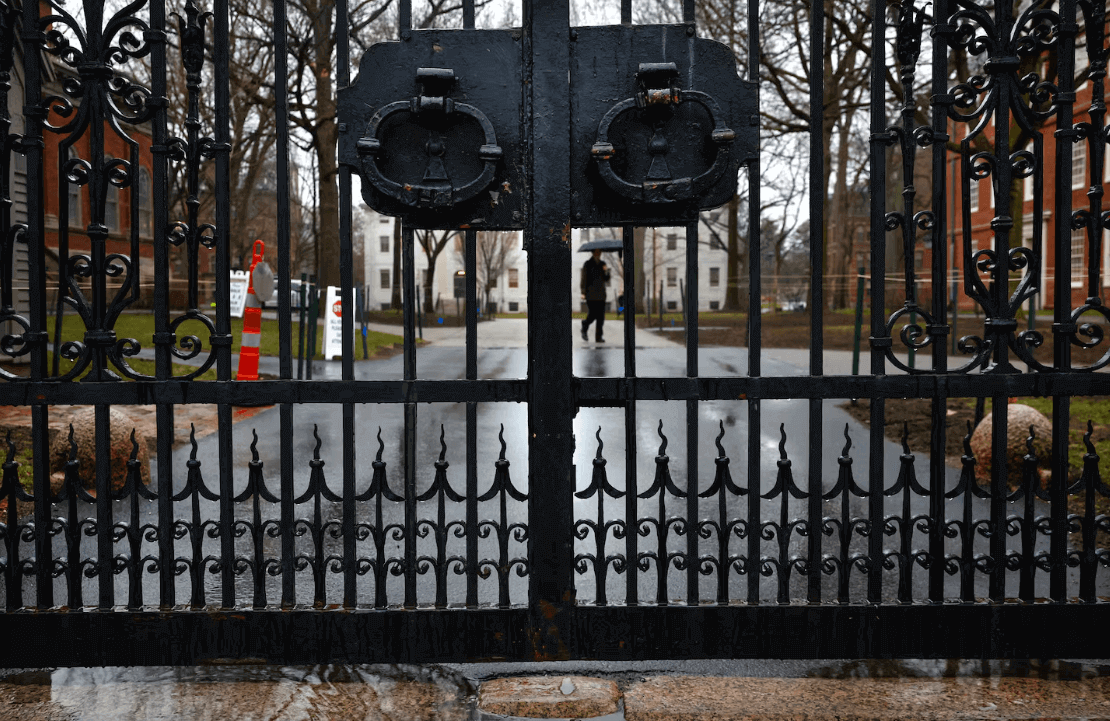哈佛会怎么做?特朗普的要求将影响 DEI、学术部门和国际学生

【中美创新时报2025 年 4 月 5 日编译讯】(记者温友平编译)随着人们对哈佛大学将如何应对特朗普政府在校园内打击反犹太主义的特殊要求的紧张局势和期待感日益增加,一些一直批评哈佛大学的知名犹太学生和校友表示,总统的施压行动做得太过分了。《波士顿环球报》记者希拉里·伯恩斯对此作了下述报道。
周五,哈佛大学领导层并未表明他们将如何应对政府的威胁,即除非哈佛大学以打击反犹太主义的名义采取广泛改革,包括与移民当局合作并终止所有多元化项目,否则将切断其获得的数十亿美元联邦资金。
但校园里的其他知名人士表示担心,特朗普总统的要求可能会适得其反;削减联邦资金只会伤害学生和研究人员,甚至引发校园对犹太人的强烈反对,而不是解决导致反犹太主义的复杂文化问题。
“反犹主义似乎是特朗普推行政策的有用替罪羊,”哈佛大学希勒尔分校前校长、大四学生雅各布·米勒 (Jacob Miller) 表示,他认为大学需要采取更多措施解决校园内的反犹主义问题。“显然,共和党人反对 DEI,从更根本的层面上讲,他们反对大学。”
哈佛犹太校友联盟发言人罗尼·布伦 (Roni Brunn) 表示,她所在的“无党派”组织的成员对政府的要求存在分歧; 她说,有些人“非常愤怒”。
“我理解这些既定目标,”布伦说。“我们需要更加细致入微,更加谨慎地制定政策。”
特朗普政府表示,在校园抗议加沙战争之后,哈佛大学和其他精英大学未能保护犹太学生免受骚扰。特朗普政府表示,哈佛大学的不作为相当于违反联邦民权法,本周早些时候,特朗普政府威胁称,除非哈佛同意周四发给官员的信中提出的要求,否则将切断联邦资金。
这些措施包括关闭多元化、公平和包容性项目;实施“择优录取”的录取和聘用政策;加强学生纪律程序;并与美国国土安全部“全面合作”,美国国土安全部的移民局特工已经逮捕并试图驱逐几名其他精英学校的外国学生,原因是他们抗议或反对以色列。
此前,政府于周一宣布将“审查”授予该大学及其附属机构(包括麻省总医院布莱根分院和波士顿儿童医院等著名研究医院)的 90 亿美元联邦拨款和合同,在此之后便发出了最后通牒。
本周早些时候,前校园希勒尔领袖米勒在《哈佛深红报》的一篇专栏文章中写道:“这些大规模的财政削减几乎肯定会威胁到癌症研究、经济政策研究和人工智能研究等客观上重要的学术研究。”
事实上,哈佛大学为数不多的公开回应之一就是校长艾伦·加伯在周一的一封信中写道:“如果停止这笔资金,将会阻碍拯救生命的研究,并危及重要的科学研究和创新。”
周五,哈佛大学发言人仅确认学校已收到校方的要求,但未进一步置评。
特朗普政府对其他精英大学也提出过类似的威胁和要求,包括普林斯顿大学、布朗大学和哥伦比亚大学。在受到失去 4 亿美元联邦资金的威胁后,哥伦比亚大学于 3 月 21 日同意了特朗普的几乎所有要求。
但哈佛大学已采取措施消除反犹太主义,包括在被指控存在偏见的节目的情况下更换中东研究中心的领导层;采用特朗普政府青睐的反犹太主义定义,尽管有人担心其践踏言论自由权;并对学生抗议活动进行更严格的监管。
尽管如此,校方仍然对哈佛大学提出了广泛的要求。
本周早些时候,一些哈佛犹太校友对特朗普政府的资金审查表示欢迎。他们希望哈佛对支持巴勒斯坦的学生抗议者采取更强硬的纪律,并结束某些学术项目中一些人认为的反以色列偏见。
目前尚不清楚哈佛社区中哪些人正在与校方合作成立联邦反犹主义特别工作组。对冲基金亿万富翁比尔·阿克曼是哈佛校友,他曾严厉批评母校处理校园反犹主义的方式,他的发言人没有回应置评请求。去年起诉哈佛大学的哈佛毕业生沙博斯·凯斯滕鲍姆本周早些时候表示,他正在与特别工作组沟通。
凯斯滕鲍姆说:“我正在以个人身份努力确保工作组和政策制定者确切了解这些校园里发生的事情。”
但哈佛大学第一位犹太裔校长、现任该校教授的劳伦斯·萨默斯 (Lawrence Summers) 表示,哈佛大学在应对反犹太主义方面存在的不足“并不能成为政府不顾法律程序、大规模越权以及进行敲诈勒索行为的正当理由”。
萨默斯在接受采访时表示:“我希望哈佛大学和其他大学能够进行必要的改革,但改革将以领导者对正确事物的信念为基础,而不是以法律以外的要求为基础。”
一些校园人士呼吁大家谨慎行事,称拒绝遵守校方的要求还为时过早。
“如果特朗普政府的行为违法,那么在法庭上抵制,甚至集体抵制,都是完全合理的,”哈佛大学法学教授诺亚·费尔德曼说。“大学拒绝遵守民权法是错误的。”
不过,其他人则呼吁哈佛大学在反击特朗普政府对学术自由的攻击方面发挥带头作用。他们表示,如果哈佛大学的领导们现在不站出来,那么拒绝可能威胁大学独立性的更多要求将变得更加困难。
哈佛大学人权、全球事务和哲学教授马蒂亚斯·里斯表示,他希望大学领导人能够“揭露欺凌和恐吓行为的真面目”,并形成一个“联盟”,让“各大学齐心协力,而不是一个接一个地被淘汰”。
“哈佛是全球高等教育的代表,因此,如果只是顺从和默许,而不采取可以被合理解读为表明立场和建立联盟的行动,那将是有害的,”里斯说。
哈佛大学肯尼迪学院研究员、人权观察前负责人肯尼斯·罗斯周四晚间在剑桥的一个演讲中表示,各大学必须联合起来“抵制”,否则政府将“一个接一个地消灭独立的声音”。
与此同时,校园里的其他人对取消多元化、公平和包容性项目的要求表示担忧,校方在信中表示,这些项目教会学生和教职员工“基于粗鲁的种族和身份刻板印象对彼此做出草率的判断”。
正在普林斯顿大学休假的哈佛大学访问学者哈利勒·纪伯伦·穆罕默德 (Khalil Gibran Muhammad) 表示,如果哈佛大学在 DEI 问题上屈服,将会有“大量教职员工和学生离职”。
穆罕默德说:“你可以预料到,许多学生明白,多元化、公平和包容项目是为了解决长期以来排斥的问题,他们不再想去哈佛这样的地方。”
题图:哈佛园的约翰斯顿门。周五,哈佛大学发言人只确认该校已收到特朗普政府的要求,并未进一步置评。Craig F. Walker/Globe Staff
附原英文报道:
What will Harvard do? Trump demands would affect DEI, academic departments, international students.
By Hilary Burns Globe Staff,Updated April 4, 2025
The Johnston Gate to Harvard Yard. On Friday, a Harvard spokesperson would only confirm the university received the Trump administration’s demands and would not comment further.Craig F. Walker/Globe Staff
With tension and anticipation mounting over how Harvard University will respond to the extraordinary demands by the Trump administration to combat antisemitism on campus, some high-profile Jewish students and alumni who have been critical of the school say the president has gone too far in his pressure campaign.
On Friday, Harvard leaders did not indicate how they would respond to the administration’s threats to cut off some of the billions in federal funding it receives unless it adopts extensive changes in the name of combating antisemitism, including cooperating with immigration authorities and ending all diversity programs.
But other prominent voices on campus expressed concerns President Trump’s demand may backfire — on them; that cutting federal funding would only hurt students and researchers and even trigger a backlash against Jews on campus instead of addressing the complex cultural issues that give rise to antisemitism.
“Antisemitism seems to be a useful scapegoat for policies that Trump is pursuing,” said Jacob Miller, a senior and former president of Harvard Hillel who believes the university needs to do more to address antisemitism on campus. “Obviously Republicans are opposed to DEI, and at a more fundamental level, opposed to universities.”
Roni Brunn, a spokesperson for the Harvard Jewish Alumni Alliance, said members of her “nonpartisan” organization are divided over the administration’s demands; some, she said, are “livid.”
“I can appreciate the stated goals,” Brunn said. “We need to be much more nuanced and much more careful about policies.”
The Trump administration has said Harvard and other elite universities failed to protect Jewish students from harassment in the wake of campus protests over the war in Gaza. Saying the university’s inaction amounts to a violation of federal civil rights law, the administration earlier this week threatened to cut off federal funding unless Harvard agrees to the demands outlined in a letter sent to officials Thursday.
Those include shuttering diversity, equity, and inclusion programs; implementing “merit-based” admissions and hiring policies; toughening student discipline procedures; and offering “full cooperation” with the US Department of Homeland Security, whose immigration agents have arrested and are trying to deport several foreign students of other elite schools for protesting or speaking out against Israel.
The ultimatum follows Monday’s announcement the administration will “review” $9 billion of federal grants and contracts awarded to the university and its affiliated institutions, including preeminent research hospitals like Mass General Brigham and Boston Children’s Hospital.
Earlier this week, Miller, the former campus Hillel leader, wrote in an op-ed in the Harvard Crimson that, “objectively important academic endeavors like cancer research, economic policy study, and artificial intelligence scholarship are almost surely threatened by these broad fiscal slashes.”
Indeed, in one of the few public responses from Harvard, president Alan Garber wrote in a letter Monday that, “If this funding is stopped, it will halt life-saving research and imperil important scientific research and innovation.”
On Friday, a Harvard spokesperson would only confirm the university received the administration’s demands and would not comment further.
The Trump administration had made similar threats and demands of other elite universities, including Princeton, Brown, and Columbia universities. After being threatened with losing $400 million in federal funding, Columbia on March 21 agreed to nearly all of Trump’s demands.
But Harvard had already taken steps to stamp out antisemitism, including replacing the leadership of its Center for Middle Eastern Studies amid allegations of biased programming; adopting a definition of antisemitism favored by the Trump administration, despite concerns that it tramples on free speech rights; and stricter regulation of student protests.
Nonetheless, the administration still made broad and wide-ranging demands of Harvard.
Some Jewish Harvard alumni earlier this week had welcomed the Trump administration’s funding review as reinforcement. They want Harvard to more strongly enforce discipline of pro-Palestinian student protesters, and end what some view as anti-Israel bias in some academic programs.
It is unclear who from the Harvard community is working with the administration on a federal antisemitism taskforce. A spokesperson for hedge fund billionaire Bill Ackman, a Harvard alumnus who has been sharply critical of his alma mater’s handling of campus antisemitism, did not respond to a request for comment. Shabbos Kestenbaum, a recent Harvard graduate who sued the university last year, said earlier this week that he is in communication with the taskforce.
”I’m working in a personal capacity to ensure the taskforce and policymakers know exactly what is happening on these campuses,” Kestenbaum said.
But Lawrence Summers, who was the first Jewish president of Harvard and is now a professor at the school, said the university’s shortcomings in responding to antisemitism do “not justify massive government overreach without regard to legal process, and efforts to engage in extortion.”
“I hope Harvard and other universities will carry out necessary reforms, but will do so based on leaders’ convictions about what is right, and not on the basis of extralegal demands,” Summers said in an interview.
Some on campus urged caution, saying it is premature to refuse to comply with the administration’s requests.
“If the Trump administration’s actions are unlawful, it’s entirely appropriate to resist them in court, and even to do so collectively,” said Harvard law professor Noah Feldman. “It would be wrong for universities to refuse to comply with civil rights laws.”
Others, though, have been calling on Harvard to be a leader in any pushback to what they see as the Trump administration’s attacks on academic freedom. If Harvard leaders don’t stand up now, they said, it will be harder to reject additional demands that might threaten the university’s independence.
Mathias Risse, Harvard professor of human rights, global affairs, and philosophy, said he hopes university leaders will “call out the bullying and the gas lighting for what it is” and form an “alliance,” in which “universities are putting their heads together, rather than being taken out one at a time.”
“Harvard is the face of global higher education, and so just to roll over and acquiesce without doing something that can plausibly be interpreted as taking a stance and making an alliance, that will just be pernicious,” Risse said.
And Kenneth Roth, a fellow at the Harvard Kennedy School and the former head of Human Rights Watch, said at a presentation in Cambridge Thursday evening that universities must join together and “resist” or the government will “pick off one independent voice after the other.”
Meanwhile, others on campus expressed concerns at the demand to eliminate diversity, equity, and inclusion programs, which the administration’s letter says teach students and staff “to make snap judgments about each other based on crude race and identity stereotypes.”
If Harvard capitulates on DEI, said Khalil Gibran Muhammad, a visiting scholar at Harvard who is on sabbatical from Princeton University, there will be “significant departures” of faculty and students.
“You could expect that many students who understand that diversity, equity, inclusion programs were meant to solve an existing problem of the long histories of exclusion would no longer want to be at a place like Harvard,” Muhammad said.

